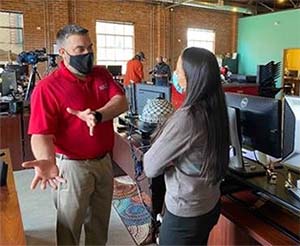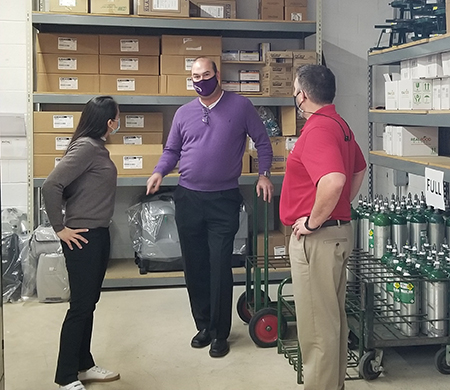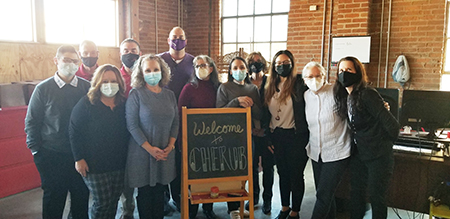Lawmaker Assesses Semiconductor Shortage’s Impact on HME
Rep. Sharice Davids (D-Kan.) meets with representatives of two Kansas HME providers, as well as MAMES, to better understand how the narrowed semiconductor supply is impacting their businesses and patients.

Rep. Sharice Davids speaks with Cherub Medical Supply Director of Operations Sam Cress.
On Monday, Rep. Sharice Davids (D-Kan.) met with staff and management of two Kansas HME providers that are facing product delays due to the shortages of component electronics such as semiconductors. Also on hand were representatives of the Midwest Association for Medical Equipment Services & Supplies (
MAMES), including MAMES Executive Director Rose Schafhauser.
David’s visited with the team of Cherub Medical Supplies, a Shawnee-based supplier of pediatric medical devices, and Lenexa-based Reliable Medical Supplies, which provides a wide variety of HME items and services, including sleep and respiratory equipment.
Both providers are feeling pressure from the supply chain issues impacting providers due in no small part to shortages of semiconductors, which are used in many medical devices, including the CPAP machines provided by Cherub and Reliable to more than 72,000 sleep apnea patients in Kansas’s Third Congressional District. Cherub works primarily with kids who need semiconductor-dependent respiratory devices such as oxygen monitors and ventilators to return home safely from the hospital. Reliable serves over 800 clients in the Kansas City area, including nursing homes.
“As a small business caring for medically fragile children in Kansas City, we have faced many issues due to rising costs, semiconductor supply chain shortages, and declining reimbursement,” said Sam Cress, director of operations at Cherub Medical Supply and a board member of the Midwest Association for Medical Equipment Services & Supplies (MAMES). “We look forward to partnering with Rep. Davids regarding these concerns to champion and protect the families we serve.”
“As a local provider of home medical equipment, we are experiencing unprecedented interruptions as we try to provide for our patients,” said Nick Hulsing, owner of Reliable Medical Supply. “The shortage of semiconductor chips has meant long backorders for equipment and uneasy delivery times for our patients. We look forward to working with Rep. Davids and her colleagues on the Hill to find ways to remedy this situation.”
Fixing the Problem
To combat the supply chain issues, Davids re-introduced the SUPPLIES Act, which aims to create a $100 million grant program for small and medium manufacturers that shift their production to manufacture PPE and testing supplies during future public health emergencies. It would also prioritize manufacturing these supplies domestically, reducing our country’s dependence on foreign countries for medical supplies, and eliminating price gouging of life-saving materials.
Davids has also helped advance the CHIPS Act, which would provide $52 billion for domestic production of semiconductor production. The Act was approved in January 2021 as part of the most recent National Defense Authorization Act, but didn’t include the funding. So, there is currently an effort to pass the Innovation and Competition Act (USICA) in the House, which would fund the $52 billion. (The Senate already upvoted USICA.)
“These local businesses are doing their best to work around supply chain issues and get life-saving machines to the children and adults who are dependent on them to stay healthy, but we can be doing more to help them,” Davids said. “I’m working to get legislation like the CHIPS Act across the finish line so that we can strengthen our domestic supply chain, lower costs, and make these critical materials here at home.”

L to R: Rep.Davids with Nick Hulsing, owner of Reliable Medical Supply and Sam Cress, director of operations at Cherub Medical Supply.
